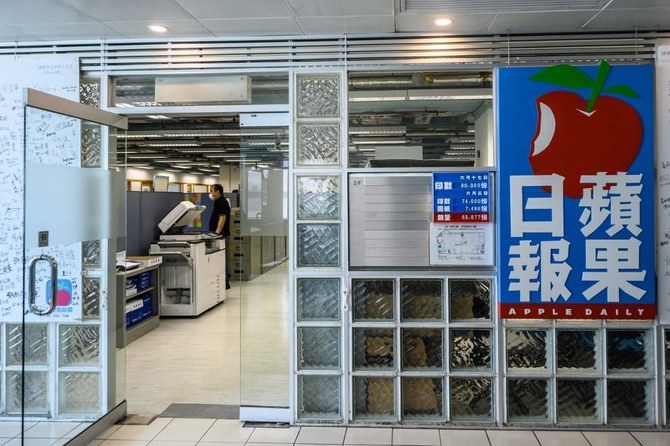HONG KONG: Hong Kong police arrested the chief editor and four executives of pro-democracy newspaper Apple Daily on Thursday, raiding its newsroom for a second time in the latest blow to the outspoken tabloid.
The paper and its jailed owner Jimmy Lai have long been a thorn in Beijing’s side with unapologetic support for the financial hub’s pro-democracy movement and scathing criticism of China’s authoritarian leaders.
More than 500 officers conducted a dawn operation which authorities said was sparked by articles Apple Daily had published “appealing for sanctions” against Hong Kong and China’s leaders.
It is the first time the content of media reporting has sparked arrests under the city’s new national security law.
In a message to readers, Apple Daily warned that Hong Kong’s press freedoms were “hanging by a thread” but the paper vowed to “stand tall.”
Its union described the operation as a “wanton violation of press freedom” that “displayed how much police power has inflated under the national security law.”
Police said the five executives were arrested for collusion with a foreign country or external elements “to endanger national security.”
“They have overall responsibility for the content, style and principles of news reporting,” senior superintendent Steve Li told reporters.
Authorities also seized HK$18 million ($2.3 million) in Apple Daily assets, the first time a national security law seizure order has been made directly against a Hong Kong media company, rather than an individual.
Hong Kong is historically a major international media hub but its press freedom ranking has slipped dramatically in recent years.
Secretary for Security John Lee declined to say which articles breached the security law or whether those who shared the articles online, bought Apple Daily or its shares, might be at risk.
“Everyone must decide for themselves,” he told reporters.
“Our actions are not targeting press freedom or journalistic work,” he added.
“We target conspiracies that threaten national security. We target perpetrators who would use journalistic work as a tool to engage in acts that endanger national security.”
Sharron Fast, a lecturer at the University of Hong Kong’s journalism school, described Lee’s comments as “ominous and incorrect.”
“It is precisely the role of a journalist in a free society to report on political views, even those that might be unwelcome,” she told AFP.
Apple Daily broadcast live footage of the raid showing officers searching the newsroom and looking through journalists’ computers.
The paper said computer terminals, hard drives and reporter notepads were among items carted away.
Among the arrested executives were chief editor Ryan Law and CEO Cheung Kim-hung who were both led into the building in handcuffs.
Hong Kong’s stock exchange said trading in shares of Next Digital — the publisher of the newspaper — had been halted.
The security law is the speartip of a sweeping crackdown on Beijing’s critics in Hong Kong since 2019’s huge democracy protests.
It has criminalized much dissent, given China jurisdiction over some cases and awarded authorities a suite of powerful new investigation powers.
Those convicted face up to life in prison and the majority are denied bail after arrest.
Thursday’s raid was the second on Apple Daily in less than a year.
The tabloid’s billionaire owner Lai, 73, was charged with collusion after hundreds of officers searched the paper’s newsroom last August.
He is currently serving multiple jail sentences for attending various protests.
Beijing has made no secret of its desire to see the paper’s voice tamed, with state media routinely describing Lai as a “traitor” and a “black hand.”
Last month, police used the national security law to freeze Lai’s bank accounts and his majority shares in Next Digital.
Until Thursday’s raid, authorities had left the company’s assets alone. It is unclear whether Apple Daily will now be able to pay its staff.
“We will try all our best to publish newspapers for tomorrow,” executive chief editor Lam Man-chung, who was not among those arrested, told AFP.
China says the security law was needed to return stability to the international financial hub.
Critics, including many Western nations, say it has been the final nail in the coffin for the “One Country, Two Systems” promise that Hong Kong could maintain certain liberties after its 1997 handover to China by the British.
More than 100 people have been arrested under the law, many of them the city’s best-known democracy activists. Others have fled overseas.
Speaking with AFP last month, chief editor Law admitted the paper was in “crisis” since Lai’s jailing but said his reporters were determined to press on with publishing.
Asked by staff what they should do if the police came to arrest him, he replied: “Broadcast it live.”


























